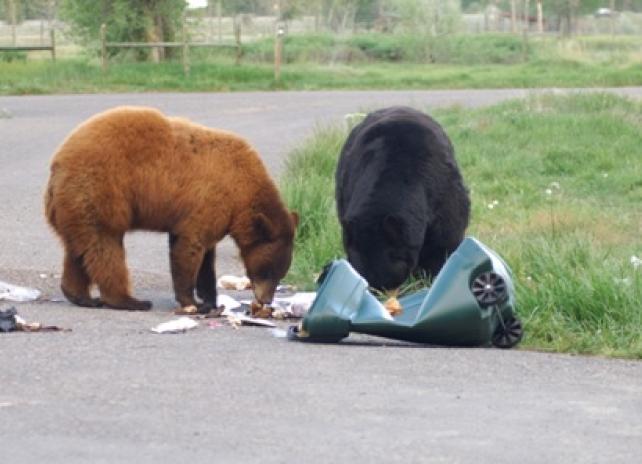
Living in Bear Country
To reduce the risk of problems with bears on or near your property, we urge you to avoid attracting bears to your residence. Please do your part so people and bears can live together.
Living in Bear Country
Garbage should be stored where bears can neither smell nor gain access to it: either in a bear-resistant container or inside a building bears can't get into. Use outside garbage cans for non-food items only. Haul garbage to an approved disposal site as often as possible, but at least once a week, to avoid the build-up of odors.
Fruit trees attract bears, especially when wild foods are scarce. Electric fencing is the most effective way to keep bears out of orchards. Pick all fruit from trees and the ground as soon as possible; do not leave fruit through the fall.
Vegetable and flower gardens also attract bears. Gardens should be located away from forests or shrubs, which bears use for security and travel. Bears will dig up carrots and bulbs, so electric fencing is a good idea.
Composting is not recommended because the odors attract bears. If you do compost, use an electric fence or enclosed, bear-resistant composter. Don’t put meat, grease, or bones in a compost pile.
Livestock and poultry feed and pet food should be stored in bear-resistant containers – such as a 55-gallon drum with a lid that seals – preferably inside a sturdy building that bears can’t get into. Reduce spillage of oats and pellets by feeding from buckets or other containers, and don’t leave leftover livestock food out overnight.
Dogs and other pets should be kept inside at night. If possible, feed pets inside. If you must feed pets outside, feed only during the day in amounts that will be consumed immediately. Don’t leave bowls and pet food out overnight.
Sheep and pigs are easy prey for bears. Sheep should be closely herded. Consider electric fencing for pigs, or not keeping pigs. Do not bury dead livestock – bears will dig them up! Haul them to a landfill or rendering plant.
Bears love honey as well as bee larvae found in hives. You can protect the hives with electric fencing or by elevating the hives on platforms supported by metal poles that bears can’t climb.
Bird feeders can also attract bears. Feed suet only during the winter months, and suspend hummingbird feeders out of reach of bears – at least 10 feet off the ground and 4 feet away from any tree trunk or pole.
Closely supervise children when they are playing outdoors. Make sure they are home before dusk and not outside before dawn. Talk with children about bears and teach them what to do if they encounter one.
If bears get into garbage or other food, REMOVE THE ATTRACTANT IMMEDIATELY AND NOTIFY THE WYOMING GAME AND FISH DEPARTMENT. Avoid giving bears a repeated food reward. Bears that associate people and places people live with easy food rewards can become dangerous, and may eventually have to be euthanized.
